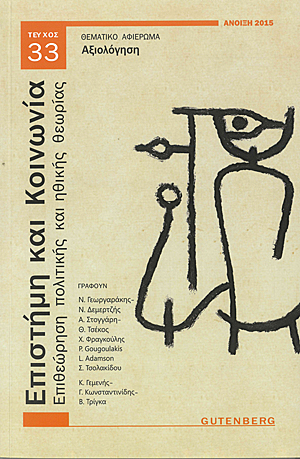Η συμβολή της αξιολόγησης στην αξιοποίηση των Διαρθρωτικών Ταμείων της ευρωπαϊκής Ένωσης
Abstract
Ο αναπροσανατολισμός της αποστολής των χρηματοδοτικών μέσων της ευρωπαϊκής πολιτικής συνοχής για την επίτευξη των στόχων της στρατηγικής ‘ευρώπη 2020’ συνοδεύεται από τη βαθμιαία ανάδυση ενός ευρωπαϊκού πλαισίου αξιολόγησης. Το πλαίσιο αυτό, το οποίο περιλαμβάνει κοινά πρότυπα ποιότητας, κοινούς δείκτες και μεθοδολογικούς κανόνες που συμπυκνώνουν εμπειρίες καλών πρακτικών, υπαγορεύεται από τη λογική καθιέρωσης μιας πιο ομοιογενούς προσέγγισης στα θέματα της αξιολόγησης σε ευρωπαϊκό επίπεδο. Ο απώτερος στόχος είναι να καταστεί εϕικτή η ανάπτυξη ενός κοινού κώδικα επικοινωνίας, μέτρησης και σύγκρισης των επιδόσεων των παρεμβάσεων της πολιτικής συνοχής στα διάϕορα κράτη-μέλη.
Article Details
- How to Cite
-
Φραγκούλης Χ. (2016). Η συμβολή της αξιολόγησης στην αξιοποίηση των Διαρθρωτικών Ταμείων της ευρωπαϊκής Ένωσης. Science and Society: Journal of Political and Moral Theory, 33, 63–90. https://doi.org/10.12681/sas.10264
- Section
- Articles

This work is licensed under a Creative Commons Attribution-NonCommercial-ShareAlike 4.0 International License.
Authors who publish with this journal agree to the following terms:- Authors retain copyright and grant the journal right of first publication with the work simultaneously licensed under a Creative Commons Attribution-NonCommercial-ShareAlike License that allows others to share the work, not for commercial purposes, with an acknowledgement of the work's authorship and initial publication in this journal. If you remix, transform, or build upon the material, you must distribute your contributions under the same license as the original.
- Authors are able to enter into separate, additional contractual arrangements for the non-exclusive distribution of the journal's published version of the work (e.g., post it to an institutional repository or publish it in a book), with an acknowledgement of its initial publication in this journal.
- Authors are permitted and encouraged to post their work online (e.g., in institutional repositories or on their website) prior to and during the submission process, as it can lead to productive exchanges, as well as earlier and greater citation of published work (See The Effect of Open Access).



